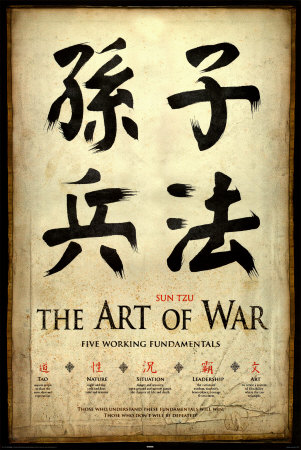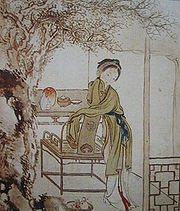THE 36 STRATEGIES AND OTHER CHINESE CLASSICS

Sun Tzu's Art of War
Question
What is the relationship between the 36 Strategies and other Chinese classics such as the Yi Jing, the Art of War, the Dao De Jing, the four great Chinese literature classics, or others?
Sifu Mark Blohm
Answer
They are related because these classics are mentioned in the Thirty Six Strategies. On the other hand, we may say they are not related because one does not need to know any of the classics to apply and benefit from the 36 strategies.
The name Thirty Six is taken from Sun Tzu's Art of War, which mentions word by word as follows:
Six six thrity six. Calculation inside is technique. Technique inside is calculation. Yin yang change law. Opportunity is inside. Opportunity cannot be nothing. Nothing means fail to hit.
The meaning of the description above is as follows:
Six times six is thirty six. When we calculate the pros and cons of a situation, we need strategies. When we use strategies we must make calculations. The universal law of change is such. Opportunities are found in every situation. When planning a strategy, one must consider benefit. If there is no benefit, the strategy is not useful.
In Yi Jing (I Ching) terminology, "six" refers to a broken line, and "nine" refers to an unbroken line. Three broken or unbroken lines form a trigram, known as "gua" There are eight such trigrams, or "bagua".
Two trigrams placed one on top of another form a hexagram. Thus the eight trigrams or bagua form sixty four hexagrams, which constitute the basis of Yi Jing.
"Six six" refers to six broken lines, which form the hexagram called "kun", which represents "earth". On the other hand, six unbroken lines form the hexagram called "chien", which represents "heaven". "Kun" symbolizes extreme yin, whereas "chien" symbolizes extreme yang.
"Six times six is thirty six" may be interpreted as there are countless situations on earth, thirty six being taken to mean infinite. Hence the 36 strategies can be used to meet any situation in life.
Situations are constantly changing. This is a universal law. When facing any situation, we must consider its pros and cons, which leads to using strategies. Reversely, in using any strategy we must consider the pros and cons of the situation.
There are opportunities in every situation. This is what we mean by saying that every problem is an opportunity for improvement. If we calculate the pros and cons, we can always work out advantages, which will lead to benefit. We must bear in mind the benefit when we plan a strategy. A strategy that does not bring benefit is futile.
The hallmark of Dao De Jing (Tao Te Ching) is flow, which is also the hallmark of the 36 strategies. Even when we are at a position of strength, we try to win the situation in a pleasant way instead of bulldozing over opponents.
A good example is the strategy, "Borrow Knife to Kill Another", which is frequently used by big companies. These big companies are at a position of strength. Even when other people or their employees object to their policies, they can still implement them if the policies bring them profits. But they would not bulldoze them even when they can.
What do they do? Their objective is to make profits, not to please other people or their employees. So they use one of the 36 strategies. They use consultants. In fact, they already have the "solutions" to their "problem". They supply the solutions to the consultants to make it appear that the consultants recommend the policies which actually came from their board of directors.
All the four great Chinese literature classics -- Romance of Three Kingdoms, Dream of the Red Chamber, Journey to the West, and Water Margins -- contain a lot of stories using the 36 strategies.
Here is a story from Dream of the Red Chamber applying the strategy "Fake Madness Not Insane".
Madame Jia, the head of an important household, invited all female relatives to a party in her huge mansion to celebrate the 15th night of the Chinese New Year. After a sumptuous meal, Madame Jia chatted heartily with her guests.
Wang Xi Fong, a very intelligent lady known for her humour, suggested they played a game called "order of the flower drum", which is similar to our modern musical chair. A flower was passed round while someone played a drum. When the drumming stopped, whoever was holding the flower would have to tell a humorous story to make people laugh.
It so happened that in the first round when the drumming stopped, Madame Jia was holding the flower.
"I'm not good at telling humorous stories, but I'll try" Madame Jia said. "At a party celebrating the 15th night of the New Year, someone drank the urine of the Great Sage Equal to Heaven."
Everybody laughed, including Wang Xi Fong who pretended not to know its hidden meaning, though she knew very well Madame Jia was making fun of her.
According to a legend, anyone who drank the urine of Monkey God, bestowed by the Jade Emperor as the Great Sage Equal to Heaven, would be very flippant with his or her mouth.
Then the game continued. Meanwhile someone secretly communicated with the drummer that the drummer would stop on hearing her gently cough. This was because everyone wanted Wang Xi Fong to tell stories, as her stories would make people roll on the floor.
Accordingly, the drumming stopped when Wang Xi Fong was holding the flower. She knew it was a trick but she pretended not to know.
So Wang Xi Fong set out to tell a story. But it was badly narrated and nobody laughed.
Wang Xi Fong was very smart. She rather offended the whole party than Madame Jia. She did not want to appear cleverer than her important host.
Within a short period Wang Xi Fong used the strategy, Fake Madness but Not Insane, three times. Do you know when were the other two times?

Dream of the Red Chamber
The above discussion is reproduced from the thread 10 Questions on the 36 Strategies in the Shaolin Wahnam Discussion Forum.
